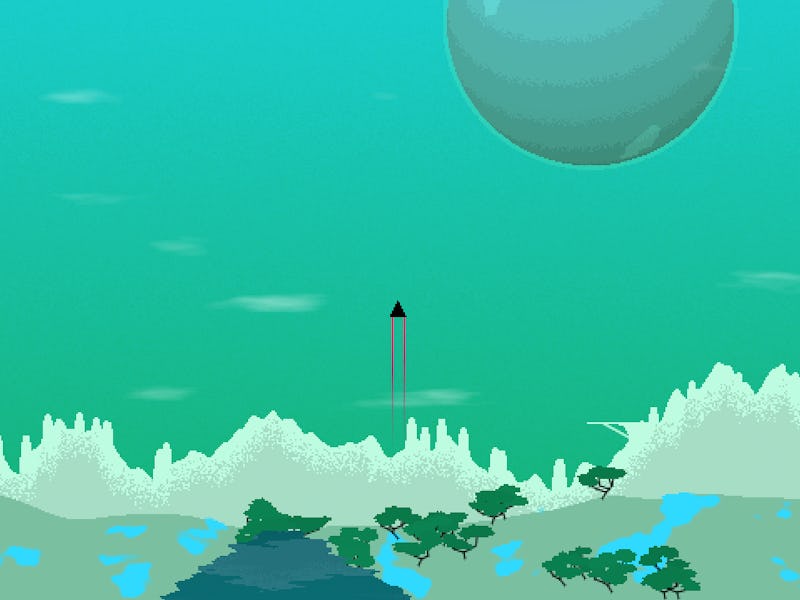Is 'No Man's Sky' Bad for Space Exploration?
Throwing Fermi's Paradox hard into reverse.

When No Man’s Sky, the self-generating universe from Hello Games, smashes into screens and the mainstream news cycle in June 2016, there will be 18 quintillion more worlds to explore. If you spent a mere second visiting every planet, your jaunt through those worlds would take you 500 billion years. Your bones would turn to dust and the protons and neutrons that dust is made of would be 42 times older than they are now.
What will make or break No Man’s Sky isn’t that people will run out of things to look at — it’s if looking at things stops being exciting. That the huge scale of the game evokes the giant galaxy of 2008’s Spore — massive, massively hyped — led No Man’s Sky creator Sean Murray to simultaneously applaud Spore while drawing a line in the procedurally generated sand on gameplay. Spore was bad, but let’s say, hypothetically, that No Man’s Sky — or the next iteration of a digital universe, or the one after that — isn’t. The act of exploration would be irrevocably altered.
No Man’s Sky’s sexiest hook is that it’s full of stuff even its creators don’t know about. There’s no way they could. It’s full of mathematical hazards and haphazards. Of course, Hello Games should take credit for building a little self-contained miniverse, but compare the algorithm that populates No Man’s Sky to the process of evolution. The real thing is different only in its complication and multiplicity. We are still discovering animals on our own rock.
Thanks to this algorithmic independence, you can discover things in No Man’s Sky previously unsullied by the human gaze. To argue that you somehow couldn’t — that what is created by humans is by it’s mathematical nature undiscoverable — is to ignore the history of science. Discovery has always been more about observation than about knowledge. Many animals have been understood to exist (or have existed) before proof (or photographs) were had. The mark of discovery isn’t newness, it’s credit taking. After Georg Wilhelm Steller described a new-to-science pinniped in 1741, he named it Steller’s Sea Lion. When a player finds a many-legged dinglebeast marauding the depths of No Man’s Sky, it will become xxSlaya420’s many-legged dinglebeast.
When someone names something, it’s a damn good sign they’re thinking of themselves in Linnean terms. This self consciousness matters because what separates humans from other animals is not that we have language or intelligence or tools. The divide is our drive to discover. Charitably, we are the ultimate vertebrate explorers. Is this exploratory ethos good or bad? It doesn’t matter. When ancestral humans pointed at the far horizon, uttered the ancient equivalent of, “Later, bitches,” and canoed their way to Australia, they were following an impulse that also moved Homo erectus out of Africa and the Neanderthals into Europe. Peregrinations are not an outgrowth of morality or — in any real sense — a product of rationality. They’re fundamental to our sense of life itself.
Still, they don’t need to be satisfied in historically contiguous ways. We don’t need to answer the questions we always thought we’d answer, including Enrico Fermi’s famous (and pardon the poor translation): “Where is everybody?”
The Fermi Paradox assumes that extraterrestrial civilizations must be exploring the universe. It’s a conclusion based on a sample size of one: We would certainly blast probes into deep space if we had the technology. But we don’t, and, as far as we can tell, nobody else does, either. That’s why, paradoxically, we still question the existence of alien intelligence.
A University of Oxford philosopher, Nick Bostrom, proposed a solution to the Fermi paradox: There’s a Great Filter that keeps intelligent life from broadcasting itself to the universe. These filter could take many forms, including barriers to the creation of RNA, nuclear war, and destruction through climate change. The Great Filter could also take the form of No Man’s Sky. If we accept that we can discover things in a virtual world, could it fulfill our need to conquer the stars? In a procedurally generated universe, you get the sense of discovery, but you also get exploration without pesky real-world physics getting in the way. One technology allows us to spread out before the other technology can boost us out of the solar system.
We’re much more capable of constructing a hypothetical galaxy that’s so easy to explore we make a game of it than we are at building Von Neumann probes, the devices we’d need to broaden our event horizons in earnest. And fast-forward today’s virtual reality technology 50, 100 years down the line? We could be on a very realistic rendering of Mars without ever leaving Earth. It is simply much easier to create a VR simulation of a universe than to explore one, which is why No Man’s Sky should be viewed with suspicion. Will it provide a profound enough experience to make us rethink space travel? Probably not, but if it sates our need to discover it will disrupt one of the great engines of human project.
Or, at the very least, propel us in a new direction defined by a very new kind of data.